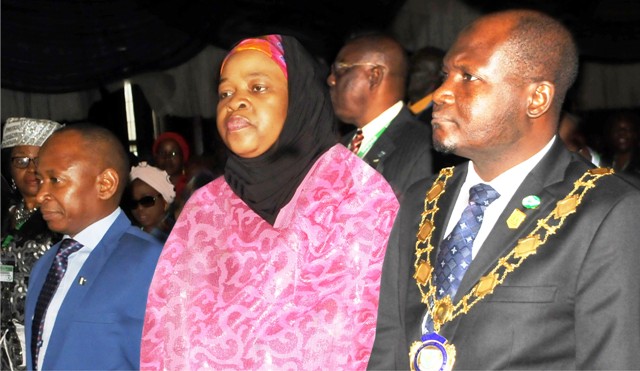Business
18 States To Benefit From $500m World Bank Projects

The National Coordinator, Rural Access and Mobility Project (RAMP), Mr. Ularamu Ubandoma says 18 more states will benefit from 500 million dollars World Bank assisted projects.
The project is under the Rural Access and Agricultural Marketing Project (RAAMP3).
Ubandoma said this at the unveiling of selected participants in the 18 states under the RAAMP 3 project and Pre-Appraisal Mission Wrap Up meeting with the development partners in Abuja last Friday.
According to him, the selected states are able to meet the criteria set by RAMP and the three development partners involved in their selection.
He said that 50 to 60 million dollars would be used to construct about 500 km roads in each of the 18 participating states across the country.
“The whole essence of the project sponsored by the World Bank, French Development Bank and Africa Development Bank is to provide suitable road network for rural farmers to convey their farm produce to the market to avoid losses.
“What we are doing here today is a meeting with new RAAMP states. New RAAMP is rural access and agricultural marketing and we have about 18 states that have been selected to participate in this new project all over the country.
“In the North East, we have Borno, Bauchi and Taraba. In North Central, we have Plateau, Benue, Kogi and Kwara. In North West, we have Kano, Kastina, Sokoto and Kebbi.
“In South East, we have Abia and Anambra. In South South, we have Cross River and Akwa Ibom. In South West, we have Ogun, Oyo and Ondo States. These are states that emerge from the six geo-political zones.
“The new RAAMP3 will be a little different from the usual RAMP1 and 2, and we have implemented projects in seven states and these projects are almost 100 per cent conclusion.
“The only difference is that we are targeting RAAMP3 in line with president Buhari’s policy on agricultural transformation.
“The policy is implemented through the Green Agricultural Alternative under the leadership of the Minister of Agriculture, Chief Audu Ogbeh.
“The thinking now is zero rejection of our agricultural produce at the international markets,” he said.
Ubandoma said that the third phase of this project, RAAMP3 was to improve rural access and agricultural marketing in the selected participating states, whilst enhancing sustainability of the rural and state road network.
“We are going to target markets and the value chains by adding value to our agricultural produce right from production level. We will be looking at storage and processes.
“We want to know how these produce can access different level of markets. We are trying to shift away from the usual market not considering the rural people.
“We are now considering the rural people because they form the bulk of our production level and they are predominantly farmers living in the rural areas’’ he said.
Business
Nigeria’s ETF correction deepens as STANBICETF30, VETGRIF30 see 50% decline in a week

Business
BOI Introduces Business Clinic

Business
Dangote signs $400 mln equipment deal with China’s XCMG to speed up refinery expansion

-
Maritime1 day ago
Customs Declares War Against Narcotics Baron At Idiroko Border
-
Maritime1 day ago
Nigeria To Pilot Regional Fishing Vessels Register In Gulf Of Guinea —Oyetola
-

 Sports1 day ago
Sports1 day agoGombe-Gara Rejects Chelle $130,000 monthly salary
-
Maritime1 day ago
NIMASA,NAF Boost Unmanned Aerial Surveillance For Maritime Security
-
Maritime1 day ago
NIWA Collaborates ICPC TO Strengthen Integrity, Revenue
-

 Sports1 day ago
Sports1 day agoTEAM RIVERS SET TO WIN 4×400 ” MORROW” …Wins Triple jump Silver
-

 Sports1 day ago
Sports1 day agoNSC eyes international hosting rights
-
City Crime23 hours ago
NCSU Hails Fubara Over 2025 New Telegraph Man Of The Year Award

